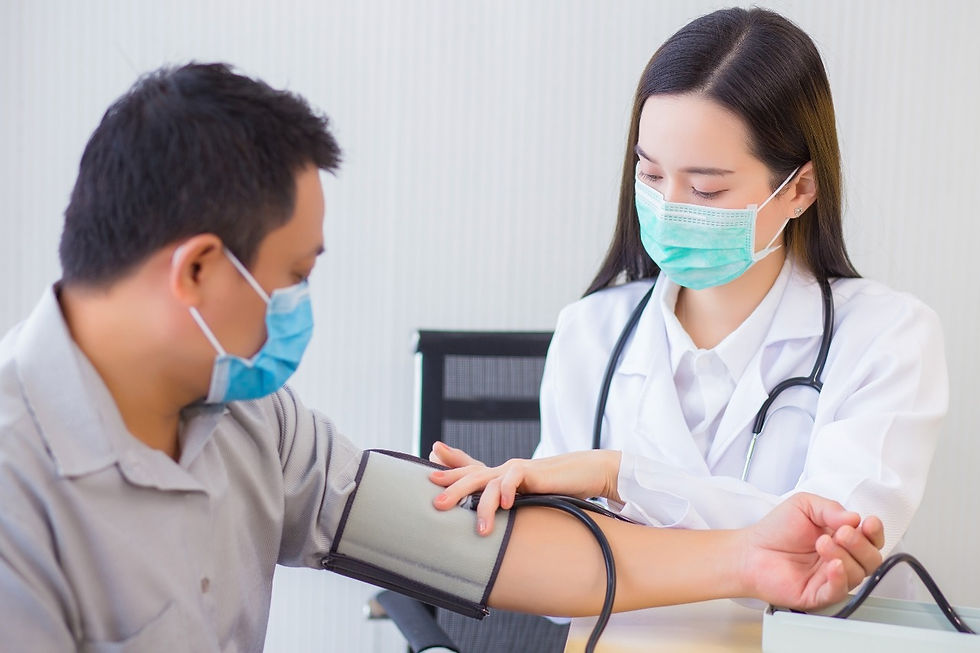Managing Hypertension: The Importance of General Heart Health
- kershin
- May 17, 2023
- 3 min read
Updated: Aug 7, 2024

Hypertension (commonly known as high blood pressure) is a silent killer. It is a common condition that occurs when the pressure of the blood vessels is too high (140/90 mmHg or higher). While the effect on the body may not be apparent to most people, the symptoms can develop over time and gradually worsen your heart health. As you age, it becomes increasingly important to ensure that your blood pressure is checked regularly. This simple yet vital action can help to detect any risks that may impact your heart health and prevent serious issues along the line.
Risk factors of Hypertension
People often have misconceptions that Hypertension can only affect the elderly or those with unhealthy lifestyle. However, the truth is Hypertension can strike anyone at any age, regardless of their current health status.

According to the Ministry of Health Malaysia, approximately three out of every ten adults aged 18 years and above suffer from this condition [1]. Given the concerning statistics, it is crucial to be aware of the risk factors that can contribute to the development of hypertension such as:
Unhealthy diet: Consuming excessive salt, indulging in a diet high in saturated and trans fats, lacking in fruits and vegetables)
Physically inactive: Lack of physical activities, sedentary behaviours like lying on the bed or sitting on a chair for long periods)
Smoking: Excessive amount of tobacco in a day.
Drinking alcohol: Consuming more than 20% Alcohol By Volume (ABV) per day.
On the other hand, there are non-modifiable risk factors like genetics, older age, and pre-existing conditions such as diabetes or kidney disease that can contribute to your likelihood of developing high blood pressure.
Symptoms of Hypertension
Hypertension can often go unnoticed as many people don't experience any symptoms. However, people with an abnormal amount of blood pressure (usually 180/120 or higher) can lead to a range of uncomfortable symptoms, these include but not limited to:

While automated devices can measure blood pressure at home, it is important to have a healthcare professional to evaluate your risk and manage your hypertension effectively.
How can you prevent Hypertension?
Incorporating lifestyle changes into your daily routine and habits can effectively aid in managing hypertension and improving your overall well-being.

Sit less and be physically active: Start with easy exercises like brisk walking, jogging, or dancing. The Centers for Disease Control and Prevention (CDC) recommends about 150 minutes of physical activity per week, or 30 minutes each day [2].
Maintain a healthy weight: Excess weight can contribute to fatty deposits (fatty substances and cholesterol) building in the arteries, raising your risk of having a heart attack or stroke. Try to maintain a healthy body mass index (BMI) and waist circumference—under 40 inches for men, and under 35 inches for women
Eat a balanced diet: Eat plenty of fruits, vegetables, whole grains, lean proteins, and healthy fats (unsaturated fats with protein and carbohydrates), and limit sodium intake (below 2,300mg per day) by taking less high-fat food.
Limit alcohol consumption: Limiting alcohol to less than one drink a day can help lower blood pressure. However, excessive alcohol consumption can raise blood pressure and contribute to heart disease.
Quit smoking: Smoking damages blood vessels and raises blood pressure. Quitting tobacco is a necessary step for heart health. Seek support from friends, family, or healthcare professionals to quit smoking and stay tobacco-free.

In most cases, doctors may prescribe medications to manage hypertension even though it may cause some undesirable side effects. Supplements such as CoQ10 (ubiquinol) can be a good alternative for those who prefer supplement instead of a prescription medication.
Studies have shown that CoQ10 has the potential to reduce blood pressure and improve symptoms of congestive heart failure [3]. However, it's important to consult with a healthcare professional to determine the correct dosages of both medications and supplements for optimal health and well-being.
On World Hypertension Day, Team Vitamode joins in raising awareness about hypertension and the importance of maintaining a healthy lifestyle to prevent and manage high blood pressure. #scientificwellness References: 1. Soo, M. J., Chow, Z. Y., Ching, S. M., Tan, C. H., Lee, K. W., Devaraj, N. K., Salim, H. S., Ramachandran, V., Lim, P. Y., Sivaratnam, D., Hoo, F. K., Cheong, A. T., & Chia, Y. C. (2020). Prevalence, awareness and control of hypertension in Malaysia from 1980-2018: A systematic review and meta-analysis. World Journal of Meta-Analysis, 8(4), 320-344. https://doi.org/10.13105/wjma.v8.i4.320
2. Centers for Disease Control and Prevention. (2021, March 4). Physical Activity Basics for Adults. Retrieved April 18, 2021, Retrieved from https://www.cdc.gov/physicalactivity/basics/adults/index.htm#:~:text=Physical%20activity%20is%20anything%20that,Physical%20Activity%20Guidelines%20for%20Americans.
3. Rosenfeldt, F., Haas, S., Krum, H. et al. Coenzyme Q10 in the treatment of hypertension: a meta-analysis of the clinical trials. J Hum Hypertens 21, 297–306 (2007). https://doi.org/10.1038/sj.jhh.1002138





